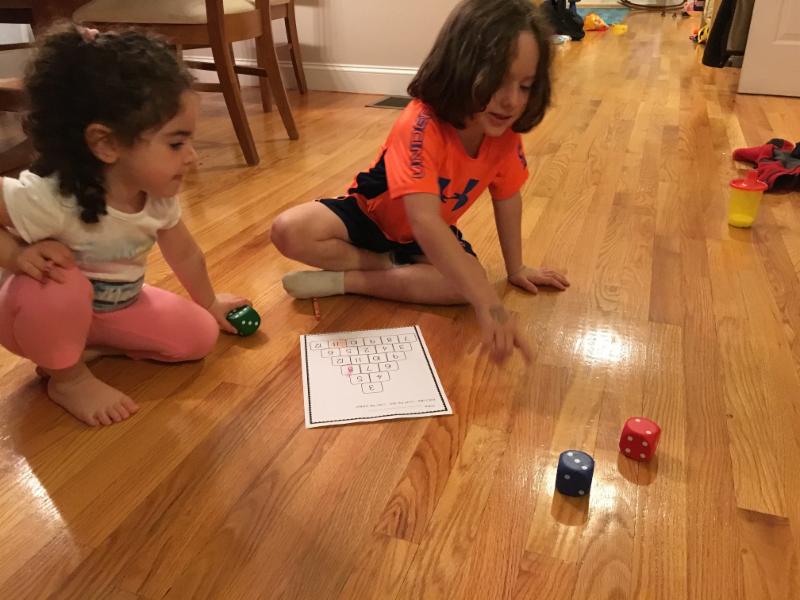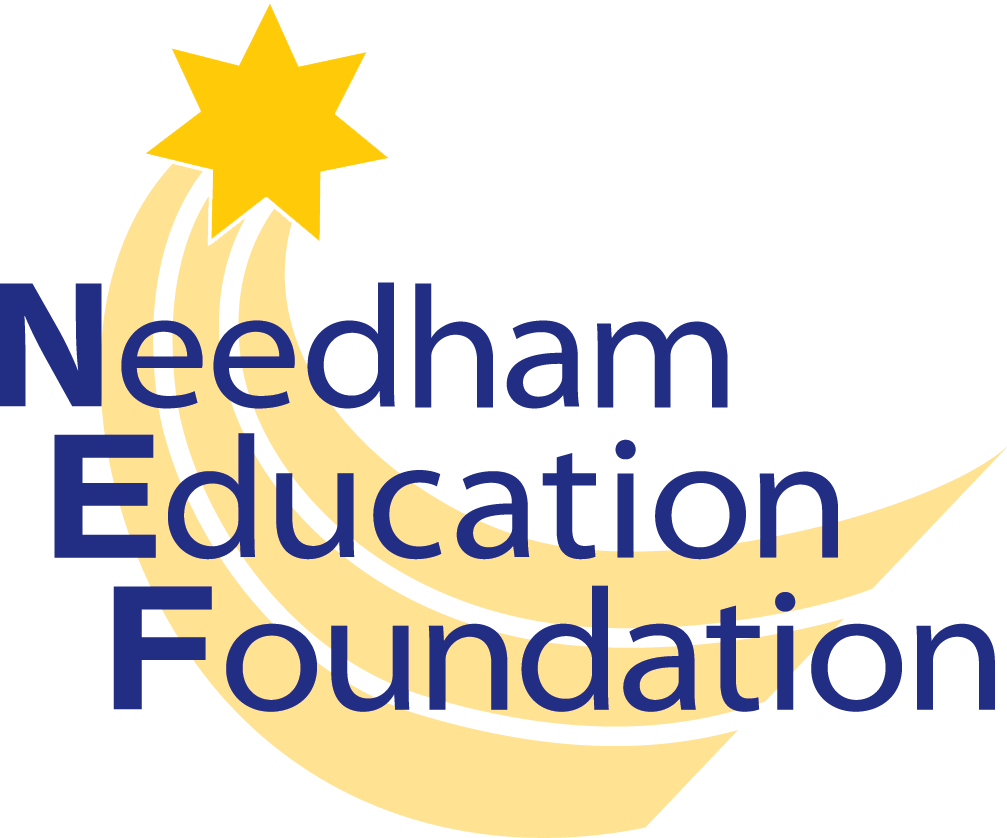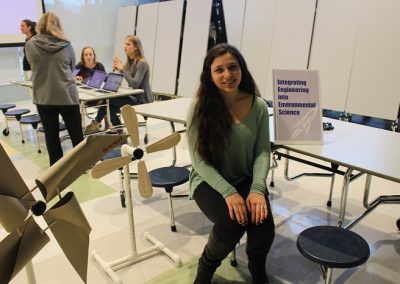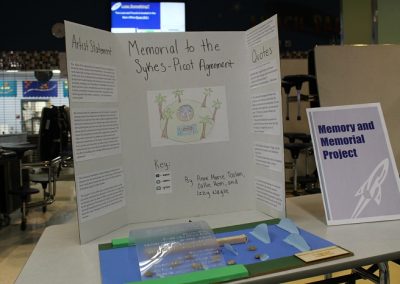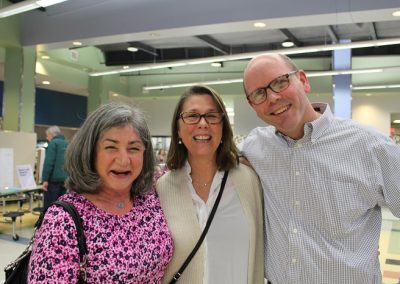Spheros Bring Excitement to Learning
Last Spring, the Technology Integration Specialists at each elementary school collaborated on a grant to bring Spheros to the elementary schools and were awarded $10,000 from the NEF. What exactly are Spheros? They are robotic balls, about four inches in diameter, that can be programmed to do cool things using an iPad or Chromebook. The visual, block-based program makes learning the basic principles of programming approachable and fun for kids. Among other tricks, Spheros can change colors, run a circuit, and keep beat with a song.
The Tech Specialists have collaborated on introductory lessons that have allowed kids and teachers to become acquainted with these little robots. Using the Draw tool, Drive tool, and some simple programming of shapes, kids have: drawn shapes by hand on screen for the Sphero to repeat; used markers, large easel paper, and a see-through plastic cup to drive Spheros and create scribble art; grades 3-5 programmed Spheros to make spirals, figure 8s and other shapes; students in 4th grade “drove” their Spheros along a story map during Media.
As the children get more adept at using the Spheros, the tricks and programming can become more advanced. For example, they’ll be able to show their knowledge of geometry by programming angles to draw specific 2-D shapes. They will also be able to program the Spheros to solve more complicated mathematical questions, for example, measuring how speed and time will affect distance.
Kara Shea, a 3rd grade teacher at Hillside, says her class absolutely loves learning with the Spheros, and that they are an excellent tool for hands-on, project-based learning. Maria DeCicco, Tech Specialist at Hillside, said the Spheros have created a lot of excitement in classes across all grade levels. They have been such a success, says DeCicco, that she knows of three students who put Spheros on their holiday wish list. As one 3rd grader said, “They are really fun. They are the coolest thing in my life!”
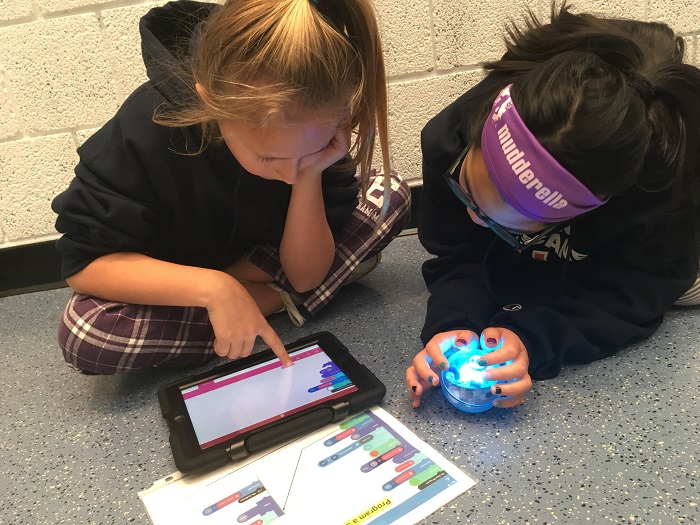
NEF Awards $35,664 in Fall Grants
The Needham Education Foundation (NEF) announced the recipients of 16 grants totaling $35,664 in the fall small grants cycle at the Needham School Committee meeting last night. Awarded grants include: playaways and digital magazines for the high school library, a giant floor map for Pollard, ukuleles for the Eliot School, an author panel at the high school, and a visit from two Lost Boys of Sudan at Newman. Other grants awarded:
- Lighting equipment for the performing arts departments at Needham High School, Pollard and High Rock, so that students will learn to operate lights and sound for all NPS performances.
- A collaboration between Pollard and the Needham Community Farm to fund a new STRETCH class and club where students will learn about food justice and gardening.
- Dialectical behavior stress management skill training for teachers at Pollard so that students will learn lasting skills for stress management. A parent information session will also be offered.
- Breakout EDU Kits for the elementary schools and High Rock, which offer a fun, creative way to develop team-building skills, critical thinking skills and can span all subjects and topics. Students work collaboratively to solve a series of problems to open locked boxes.
- A visit to each elementary school from Eine Kleine Konsort, a professional recorder quartet comprised of veteran music educators.
Author Jerry Pallotta Visits Hillside
Hillside kindergarten and first grade students could not contain their giggles in response to Jerry Pallotta’s audiovisual antics on a recent Thursday morning. Pallotta is a former Needham native and the author of the Who Would Win? series along with multiple alphabet and math themed books. He was invited to Hillside to make three presentations explaining the steps that go into writing non-fiction books and showing how much fun writing and reading non-fiction can be.
Pallotta’s day-long visit was funded by a grant from the NEF’s Spring 2017 Small Grants Cycle. Hillside parent Seema Meloni authored the grant with the support of school-based partners Liz Hitron, Hillside librarian, and Sena Hsu, 4th grade teacher. Their application pointed to recent research and changing Common Core standards that require elementary teachers to increase the amount of reading time that is focused on non-fiction texts to 50%. “It’s often challenging to find ways to excite students to focus on non-fiction texts,” Meloni wrote. This visit was envisioned to be a creative and innovative way to spark children’s interests and encourage them to spend more of their independent reading time on non-fiction materials.
“I loved that he showed students his writing drafts and work-in-progress to show that writing truly is a process,” Sena Hsu pointed out, “He also shared some titles and ideas of books that never got published. It’s so important for kids to realize that even adults try and don’t always succeed and that’s ok. That’s how we learn and grow. What great Growth Mindset moments!”
Jacob Peters, 4th grader, summed up the visit: “Jerry Palotta is a very bright and kind person. He is an awesome author, too.”
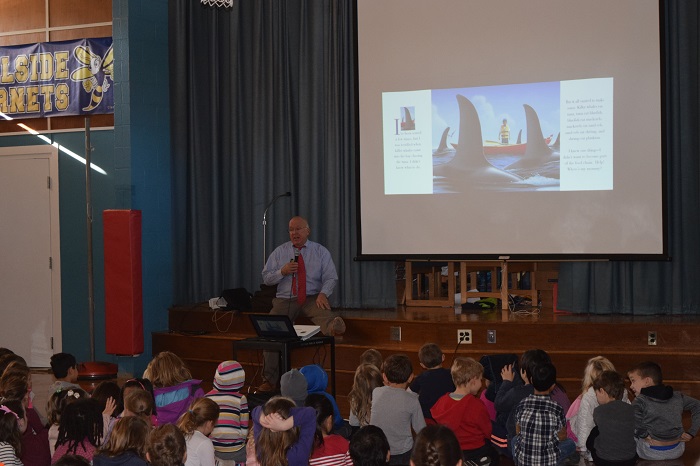
Race to Nowhere: Film and Panel Discussion
Nearly 200 parents, teachers, administrators and community members filled the Pollard auditorium on October 19th to watch a screening of Race to Nowhere. The film, which was funded by a NEF grant, examines the culture of over-scheduling, over-testing and over-pressuring children. It “reveals an education system in which cheating has become commonplace; students have become disengaged; stress-related illness, depression and burnout are rampant; and young people arrive at college and the workplace unprepared and uninspired.”
The film was introduced by Tamatha Bibbo, Principal at Pollard Middle School, who said that the new STRETCH Block is one way Pollard is trying to take some pressure off of kids during the school day. STRETCH classes meet for 6 weeks, twice a week, for 30 minutes each, and offer students the opportunity to “stretch their skills and competencies through enriching activities, and explore interests without the pressure of homework or assessments.”
After the film concluded, a panel of four educators took questions. Parents were curious what the Needham Public Schools are doing to address the issues presented in the film—especially considering it was released in 2010. Michael Goodin, Founder of the Rivers and Revolutions Program at Concord-Carlisle High School, reminded the audience that “seven years is just a blip in the education system. It’s going to take years and years to change things.” Lisa Fiore, Professor of Developmental and Educational Psychology at Lesley University, recommended that parents attend school committee meetings to let their concerns be known.
All agreed that professional development is one key to exploring the topics that were addressed in the film. Aaron Sicotte, Principal of Needham High School, said that the longer school day is enabling teachers at the high school to meet once a week.
The amount of homework was also a topic of conversation. Sicotte commented that homework is something “we’re continuing to talk about.” Parents and teachers need to consider, however, “If a child is taking six hours on homework, have we chosen the right class for him or her?”
Jimmy Odierna, Interdisciplinary Learning Specialist and Co-Founder of the Greater Boston Project at Needham High School, commented that the district is starting to focus more on growth mindset. Teachers of the Greater Boston Project have changed the rubric to include assessments on how much a student has grown and how a student has rebounded after dealing with a setback.
The pressure to achieve and attend the top colleges was a recurring theme throughout the movie. Odierna said “We, as a community, still push the top schools … Do kids need to go to an Ivy League school to be successful? Of course not.” He also stressed that NPS are focusing more on social-emotional learning and project-based learning. Sicotte added, “It’s a hard balance because we have a state and nation that has high expectations, and the town of Needham pays a lot of attention to MCAS and SAT scores.” “How do we make sure we have healthy kids?” he asked. “As parents, it’s important to know your kids and find a path that makes sense for them, and that path won’t necessarily be the one your neighbors are following.”
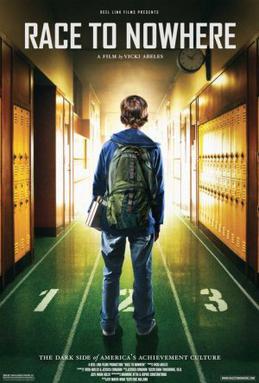
Needham Times Interviews NEF Co-Presidents
By Stefan Geller from The Needham Times, August 28,2017
Sarah Winig and Kelly Partridge both joined the board of the Needham Education Foundation (NEF) three years ago and have since become co-presidents of the organization.
The NEF raises funds and awards grants to the public schools for programs and equipment that falls outside of public funding.
The NEF was founded in 1990 by Needham High alumni, who built a sustaining fund that helps the foundation today, though it still raises money each year. The grants have paid for all kinds of school programs, such as the DaVinci Engineering Lab, interdisciplinary projects and small grants to pay for authors or performers to come speak to the kids. Winig and Partridge sat down with The Needham Times to discuss the work they have done with the NEF.
What are you most proud of that you have helped bring to the Needham schools?
SW: The Greater Boston Project. A few years ago the board and the district worked together to come up with an idea for an interdisciplinary learning class. It’s a team-taught class with an English teacher, math teacher and social studies teacher. They studied a bunch of different themes about what made Boston the way it is. It has been a phenomenal thing for the kids.
KP: I was going to say the same, because it was a really big undertaking. Now that it’s been five years since we kicked the project off, the district has taken over the funding of the three teachers and the class is continuing, and now the high school is looking to offer more interdisciplinary classes. For so long kids have been taught English, science and math in separate rooms, but more studies show that that doesn’t work in today’s world and the NEF is helping the school move away from that.
Which program do you think gets far too little funding?
SW: Professional development is something the district asks us a lot about. At first we were nervous to fund it because it doesn’t seem to directly benefit kids, but if a teacher learns a new way to teach a subject or learns a completely new subject that will benefit them. And there are limited funds for professional development.
KP: I think new technology doesn’t get enough funds. Technology is changing so fast and for any school district to try to keep up is impossible. We’ve been trying to help here and there. All the classrooms have smartboards, the NEF funded the first ones a few years ago then the district got them for everyone. There’s so many pieces of technology and it’s hard for the district to keep up.
If you were back in high school what do you wish an educational fund could have provided you?
SW: The ones that excite me are the hands-on programs. Like the planetarium that we funded for the science center, or the sandbox at Pollard Middle School that has a projector that overlays a topographic map which changes as you change the surface of the sandbox. It’s hands-on things like that that I wish I’d had.
KP: I would have liked having cool new materials. And more in the sciences, to be able to have access to the equipment that professionals use as a high schooler is a really cool thing. And while we do big projects like the Greater Boston Project, the nuts and bolts of what we do are small things like that.
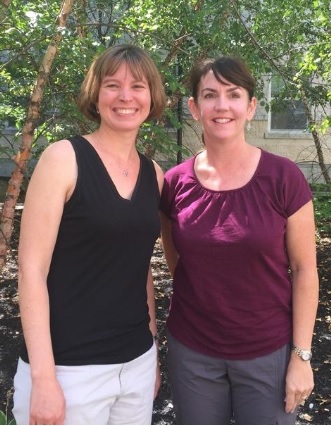
High Rock Creation Lab
Last spring, the NEF approved a small grant written by Erin Mack, High Rock’s Technology Integration Specialist, to transform the technology lab into a Creation Lab. We had a chance to sit in on a class in the Creation Lab in March, where everything that Ms. Mack envisioned in her grant application has come to life in her classroom.
Where there were once rows of computers facing a whiteboard, there are now lively work spaces defined with colorful rugs, furniture and dividers. During our visit, some students were recording in front of a green screen with plans of dropping in backgrounds suitable to their project. At one grouping of computers, two students were creating a poster together, while another group lay on the floor filming a stop motion film using their iPads, an iPad stand, and a whiteboard.
Erin never sat down while we were there – she moved from group to group and answered questions, gave instructions and ideas, and challenged students to think of new ways to accomplish their tasks. In her grant application, Erin wrote, “Imagine a room where teachers can be the facilitator and students have the autonomy to create, collaborate, and learn at different paces, showcasing their learning in various ways. The possibilities for differentiation and creativity are extensive.” Kudos to Erin on a well-conceived grant and accomplishing her vision with the High Rock Creation Lab.
Reaction from staff and students has been very positive, too!
“(I liked) the options available for students to have a choice in their final project for my course. There were designated spaces for kids to work in small groups or individually. All materials were available to help them be successful.” – HR Teacher
“I liked that you could be super creative with the stop motion.”- HR Student
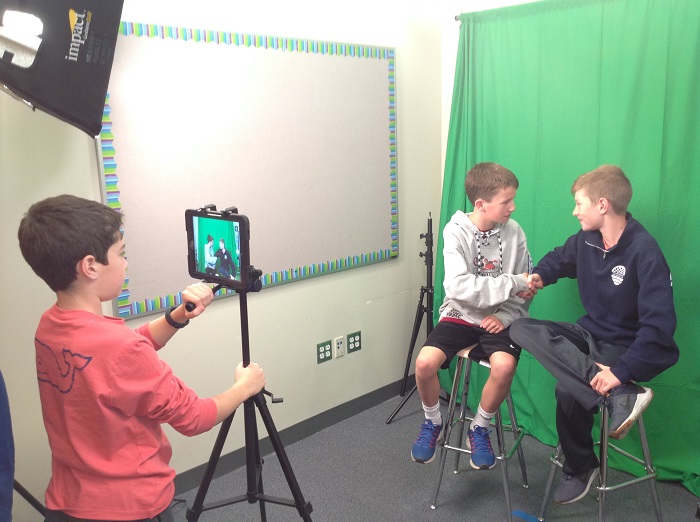
Innovation Night at Needham High Celebrates NEF Partnership
On Wednesday, May 10, Needham High School (NHS) hosted Interdisciplinary Innovation Night, showcasing the work of over 700 high school students enrolled in 32 interdisciplinary classes and units of study. The evening also celebrated the conclusion of a successful 5-year partnership and collaboration between NHS and Needham Education Foundation (NEF), in which NEF invested more than $550,000 to launch interdisciplinary units of study at the high school.
Established in 2012, the partnership between NHS and NEF began with the creation of the Greater Boston Project (GBP), a class that integrates social studies, English and mathematics, and in which students use technology to build 21st century learning skills. The partnership grew to fund the Da Vinci Workshop, a lab space for hands-on learning and technological creativity; a two-year dedicated part-time Interdisciplinary Learning (IL) Specialist position at NHS; and four years of a “mini-grant” fund, which seeded many of the interdisciplinary units of study on display at Innovation Night.
While the high school’s formal collaboration with NEF is ending, the partnership established a model for interdisciplinary teaching and learning that will continue to grow both at Needham High School and throughout the district. The NEF will continue to support innovative interdisciplinary programs through its annual small and large grant programs.
“The funding by the NEF has allowed us to grow these programs at a much faster rate than the school would have made on its own,” said Jimmy Odierna, IL Specialist at NHS and one of three founding teachers of the GBP. “It is amazing to see the vast quantity, quality, and diverse types of work happening in the school. There is a lot of pride from both the faculty and students around the success we see tonight. These students are gaining skills and experiences that will better prepare them for the world ahead.”
Odierna organized the Interdisciplinary Innovation Night, which showcased the growing body of student work integrating history, engineering, art, and robotics, among other disciplines. These projects included:
- Memory and Memorials Project – 10th grade history students utilize the Da Vinci Workshop and art studio to design and build memorials to key moments in history.
- Kinetic Sculpture – Students in robotics and sculpture classes collaborate to build kinetic sculpture pieces.
- Integrated Environmental Science – Through field study, students research local ecosystems and build functioning wind turbines out of
everyday materials.
“The success of our collaboration cannot be reduced to numbers, but the numbers do give you an idea of how this big idea has grown ever larger,” said Jennifer Quinn, co-President of NEF in her opening remarks. “One two-block interdisciplinary class, 11 interdisciplinary units of study, 36 teachers now teaching interdisciplinary classes or units, over 100 teachers participating in professional development, more than 1,000 students impacted. And we are very excited that those numbers will continue to grow.”
NEF Awards $31,415 in Spring Grants
The Needham Education Foundation (NEF) announced the recipients of 7 grants totaling $31,415 in the spring small grants cycle at the Needham School Committee meeting last night. The grants included one express grant and one multi-school grant benefitting all five elementary schools.
Awarded grants include:
• A multi-school grant to fund the purchase of Sphero SPRK Power Packs for each elementary school. These robotic balls utilize a visual block-based program and make learning the basic principles of programming approachable and fun.
• Funds for materials and technology that will enrich the curriculum of Engineering Design 101, a new course being offered at Needham High School.
• An author visit with non-fiction writer Jerry Pallotta, who will conduct presentations for students at Hillside to help increase excitement for non-fiction reading and writing.
• The purchase of 40 Wacom Intuos Drawing Tablets which will enable students at the High School to explore advanced digital illustration using the same tools that many professional digital artists currently use.
• A visit by Robin Pease, a Native American storyteller, who will educate Eliot students on Native American mythology and history through song, language, dance and games.
• An Express Grant that replicates grants provided to the Mitchell, Hillside, Eliot, and Newman Elementary Schools to provide more culturally diverse classroom libraries at Broadmeadow Elementary School.
• Funds to develop a curriculum at Mitchell which aims to empower fifth graders with the skills needed to practice everyday courage and resilience.
NEF Continues to Support Interdisciplinary Learning at NHS with Help from Staples Foundation
In its fifth and final year of funding from NEF, the Interdisciplinary Learning Initiative (ILI) is a collaboration between NEF and Needham High School (NHS) intended to launch an interdisciplinary model of teaching and learning at NHS. The cornerstone of this collaboration was the development and implementation of the Greater Boston Project (GBP), a two-block interdisciplinary class that combines instruction in English, History, and Statistics. The collaboration has also seeded many smaller units of interdisciplinary learning (IL) programming, such as Kinetic Sculpture and Art in the Dark.
An important piece of the collaboration has been funding a part-time IL Specialist position at NHS dedicated to overseeing and supporting current IL projects, seeding new IL opportunities, and promoting IL at NHS, throughout the district, and in the community. On February 28, the School Committee voted to accept $36,000 in funding from NEF to support the IL Specialist position for a second year.
The NEF gift is made up in part by a grant of $500 awarded to the NEF by Staples Foundation, the private charitable arm of Staples, Inc., through a program called 2 Million & Change. With a recommendation from Staples associate Jodi Fletcher, NEF was awarded funding in support of its Interdisciplinary Learning Initiative (ILI).
“We were very pleased to be recognized by Ms. Fletcher,” said Jennifer Quinn, NEF Co-president, “and we are grateful for the support of all the Needham area businesses and families, including Staples Foundation, that helped to make this very large, multi-year collaboration with NHS possible. Funding the innovative IL Specialist position will ensure that the impact of the ILI remains broad and lasting.”
Kindergarten Math Backpacks
In Spring 2016, NEF funded a $12,000 multi-school grant for math backpacks in every kindergarten classroom across all five elementary schools. With three backpacks per classroom, students take home math-related activities they can do with their families.
Elaine McKenna, grant writer and Hillside/Eliot math coach explains the program, “The kindergarten math backpacks are a great home school connection where the students are completing math activities, playing math games, and are introduced to math literature. The math concepts are aligned with Massachusetts State Frameworks but are introduced and practiced in a fun and engaging way.”
Backpacks contain a journal for students to record their experience with the backpack, which includes books, interactive games and manipulatives. Teachers report that their students are enthusiastic about the program, “The kids really enjoy using the math backpacks. They come to school excited to tell me that they played the games with their families.” And in the words of several students,
- “I love all the games!”
- “I learned how to count by tens.”
- “The books are my favorite!”
